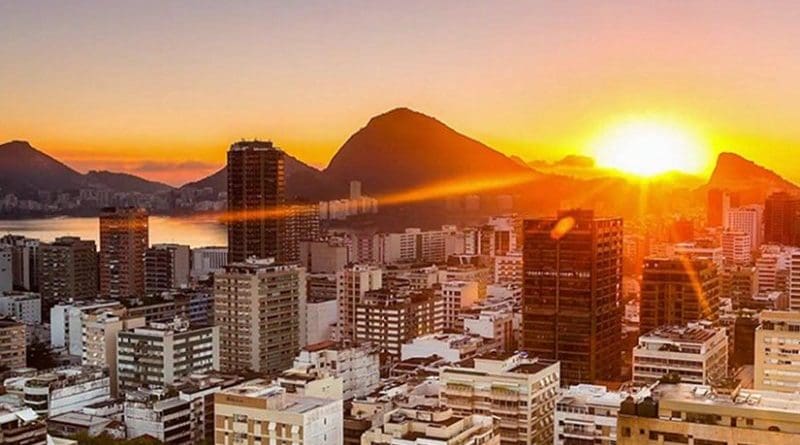Brazil’s Foreign Policy And The Changing Global Order – Analysis
By JTW
By Carlos Milani*
Brazil is a 200 million-plus vibrant democracy and Latin America’s largest economy, with a GDP of 2.3 billion USD in 2014. Its foreign policy operates within a framework that consists of a plurality of actors and agendas. In addition to the traditional role of one of the oldest bureaucracies in Brazil (the Ministry of External Relations, widey known as Itamaraty), ‘domestic ministries’, federal agencies, subnational entities, and numerous non-state actors not only defend public and collective interests (like public health, human rights, education, culture, environment), but also the interests of economic sectors. This plurality of actors and stakes results in an increasingly complex decision-making process that reveals the growing importance of domestic politics in foreign policy.
It is obvious that in the formulation and implementation of its foreign policy, the Brazilian state cannot ignore the relevance of the US on the American continent. However, the erosion of its hegemony and the emergence of China as a key trade and investment partner balance the American regional role significantly. China’s emergence in the face of a somewhat crumbling America also poses a number of challenges related to the future of manufacturing and a model of exports increasingly concentrated in commodities. Moreover, Brazil also needs to tackle extremely relevant issues related not only to regional integration (MERCOSUR, UNASUR), the BRICS grouping, the IBSA forum, but also to the future of Trans-Pacific and Trans-Atlantic trade negotiations, the emergence of the Pacific Alliance (including Mexico, Colombia, Peru and Chile), economic growth opportunities in Africa, and the strategic importance of the South Atlantic rim and the Middle-East, among other issues.
In the particular field of South-South relations, Brazil deals with a wide range of forms of cooperation among developing countries, from multilateral negotiations (the G-77 or G-20 trade), the formation of political coalitions (IBSA, BRICS), the promotion of the South–South integration processes (MERCOSUR, UNASUR), making room for interregional dialogues (Africa–South America, Arab Countries-South America summits), and the financing of infrastructure projects through subsidised loans, to modalities of technology transfer and exchange of experiences in the field of public policies and technical co-operation. All this shows that Brazilian SSC strategies have a clear political dimension, which provides a platform for cooperation among countries that want to strengthen their bilateral ties and multilateral coalitions in order to obtain bargaining power on the global agenda. It is true, however, that this policy decision may even result in domestic opposition, which tends to denounce Brazil’s neglect of its traditional Northern and Western partners.
No less meaningful is the fact that Brazil’s South-South cooperation strategy also has an economic dimension through the increase of trade and investment between Brazil and other developing countries. Between 2004 and 2012, there was a substantial growth in economic relations (trade, investment and the presence of Brazilian companies) between Brazil and other developing countries in Latin America and Africa. Brazilian business also benefits from the opening of markets in African, Middle East and Latin American regions. Prominent companies, such as Odebrecht, Camargo Corrêa, Andrade Gutierrez and Queiroz Galvão, operate in countries, such as Mozambique, Angola, Ecuador, Uruguay, Cuba, Mauritania, Algeria and Libya. In the case of the extraction of natural resources, two companies (Vale and Petrobras) are responsible for the majority of Brazilian investments. Vale operates in various countries in Africa, such as Zambia, Gabon, the Democratic Republic of Congo (DRC), Angola and South Africa. In Mozambique, Vale beat its international competition, winning the right to mine coal at Moatize, which requires more than $4.5 billion in investments. Petrobras also operates in countries, such as Angola, Libya, Namibia, but Nigeria is its main partner in Africa.
Under President Dilma Rousseff, there has been a change in style and intensity regarding Brazil’s foreign policy. Brazil still seeks to benefit from changing hegemonic structures of global governance and also to be part of the international game. This defence of a greater cooperation among the countries of the Geopolitical South and of regional integration can be understood as important diplomatic strategies towards the emergence of Brazil as a global power. However, in the last three years, Brazil’s economic activity has shown clear signs of a prolonged recession associated with the long-term process of deindustrialization and a political crisis that is stalling Dilma Rousseff’s government in her second mandate, which was initiated in January 2015.
What effects does the economic and political crisis have on Brazil’s foreign policy and its global player status and capabilities? Two main dimensions can explain the nature of this crisis. First, it has domestic roots. In the aftermath of four unprecedented, consecutive presidential victories for the Workers Party in 2014, Dilma Rousseff shows tremendous difficulties in order to lead her government and overcome a deficit of confidence. Secondly, the Brazilian crisis is profoundly linked to the international scenario. The reduction of China’s demand for commodities has negatively influenced the Brazilian economy. Hindrances around the conclusion of WTO’s Doha Round and the negotiation of trade and investment agreements outside the multilateral track also pose enormous challenges to Brazil’s foreign trade policy. Should the country abandon the idea of a stronger South American pole and individually sign up free-trade agreements with developed and other developing economies? Should Brazil bet on regional integration and continue its focus on South-South relations, including the BRICS grouping, the IBSA Forum, and cooperation with African and Middle East countries? Nowadays, the country lacks a larger strategic consensus on its future, and President Rousseff will need to tackle some of these issues in the coming months.
*Carlos Milani, Associate Professor and Research Director at the Institute for Social and Political Studies at the State University of Rio de Janeiro
**This article was first published in Analist monthly journal’s December issue in Turkish language.

